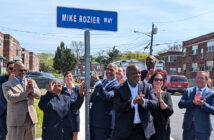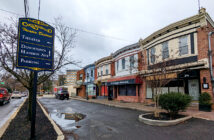In efforts to revitalize its commercial sector, Haddon Township is leaning on recruitment, redevelopment, and a healthy dose of alcohol.
By Matt Skoufalos
Because of its unusual boundaries, which include the exclave West Collingswood Heights and West Collingswood Extension, “We don’t have the same footprint that other towns do,” said Kate Burns, Director of the Haddon Township Business Improvement District (BID).
Yet within the less than three square miles it occupies, Haddon Township packs a commercial punch.
From auto parts to party supplies, yoga instruction to tax preparation, its BID is home to 174 businesses assessed at nearly $75 million annually.
It generates about $150,000 to $160,000 in annual revenues, which pay for practical needs—sidewalk repair, curb striping—beautification efforts—landscaping, holiday decorations, façade improvements—and hosting town-wide events.
“I think the biggest impact we can make is in marketing the town,” Burns said. “You want it clean, safe, and attractive.”
But in a down economy with strict real estate and lending markets, what residents are noticing more than the condition of the sidewalks in Haddon Township is often the darkened storefronts beyond them.

Expensive lease terms from out-of-town commercial property management companies can often keep a store vacant. Finding the right tenant for the site of the former Thriftway grocery store, which stands apart from the downtown commercial district, complicates matters further. Credit: Matt Skoufalos.
‘Not the mom-and-pop story anymore’
By a rough calculation, there are at least 12 commercial vacancies on Haddon Avenue alone, Burns said. That figure is complicated by the way the properties are subdivided (prospective tenants could choose to merge smaller units into a single space, for example).
Yet as much as local leaders work to recruit new entrepreneurs to the community, there are limits to what can be done from the governmental side, Burns said.
It’s not even a question of finding a new partner that could somehow connect all the dots: the township already is home to a variety of businesses that run the gamut from retail to dining to professional services.
“We’re the butcher, the baker, the candlestick maker,” Burns said. “I would just like to know what we don’t have.
A key element that separates Haddon Township from its neighbors is access to alcohol. With a handful of liquor stores, gastropubs, and bars, the municipality has crafted a response to Collingswood’s B.Y.O.B. restaurant scene and the broad sidewalks of the Haddonfield shopping district.
But there are only so many liquor licenses to go around, and more than a few commercially zoned holes to plug.
Some of the shopping-center vacancies remain that way because commercial rents are “astronomical,” Burns said, and can range into the tens of thousands of dollars, even excluding other leasing charges.
“People just don’t seem to understand that it really basically comes down to the investor,” she said. “I can suggest places [to a prospective tenant, but]if you don’t have the cash flow, you’re not going to make it.”
The longest-lasting businesses in town are often those whose operators own their own real estate, Burns said, although knowing that still doesn’t really help recruitment efforts.
“You can go through that whole dialogue with everybody,” she said, “but I do not have the authority to go to a building owner and say, ‘Would you lower your rents a little? Your businesses may stay open longer.’
“It’s not the mom-and-pop story anymore,” she said. “Businesses can’t get loans like they used to.”
The township is hoping that redevelopment efforts will drive an influx of new residents who might rent apartments in the Albertson Village or Haddon Town Center and spend their disposable income in town.
“You need bodies,” Burns said. “You need people on the avenue. [The] Russell Cast Stone [site]is going to be a great punch in the arm.”

Bark Tees owner Mark Concannon says that if local residents want to see a stronger retail presence, they need to patronize existing stores more frequently. Credit: Matt Skoufalos.
‘Stop going to the mall’
Even with new blood and a stiff drink, operating a brick-and-mortar retail storefront in the age of e-commerce is challenging, said Mark Concannon, whose Bark Tees just celebrated its second anniversary in Haddon Township.
“The walk-in business, unless you’re a destination store, is pretty difficult,” Concannon said. “You’ve got to have a well-researched idea and some money to ride out the rough patches.
“Unless you have a commercial side to what you do or an online presence to offset your expenses, it’s difficult,” he said.
“You’ve got to come into an area like this and engage the public on multiple levels.”
Bark Tees, which produces small-batch graphic t-shirts, doesn’t rely exclusively on foot traffic at its Haddon Avenue address. The business also provides screen-printing services for custom orders and fundraisers, and offers its products at wholesale prices for other vendors to re-sell.
What frustrates entrepreneurs like Concannon, however, is hearing chatter about how the business district needs more commercial space from “the people I don’t see shopping around here.
“You talk about local business, you’ve got to stop going to the mall,” he said.
Community-wide events put on by the BID help drive foot traffic too, Concannon said; but in the end, he also credits alcohol with doing the yeoman’s share of the work.
“Thank God [P.J. Welihan’s owners] the Platzers are here,” he said. “They bring a lot of people to town.”

Even though it has fallen into disrepair, the historic Westmont Theater is still a viable commercial opportunity for the investor with enough capital, says Mayor Randy Teague. Credit: Matt Skoufalos.
‘We’ve come a long way’
Haddon Township Mayor Randy Teague is no fan of the darkened commercial spaces in his town, but points out that some of the more visible vacancies—the Westmont Theater and the former Crystal Lake Thriftway grocery—are special cases.
“The theater is somewhat of a different type of a situation because that is on the state historic registry and we can’t do anything with that building inside or outside,” Teague said.
“We’d have to restore it to its original look, which is very costly.”
In addition, environmental cleanup at the site will include remediating asbestos within the building as well as an underground oil tank.
These specific expenses are “limiting the potential tenants or owners for that building,” Teague said, “because the construction cost is so high and you don’t have a lot of flexibility.”
Nonetheless, he said, “We do have somebody very interested in that and we have to look at the numbers.”
As for the former grocery store, Teague said it “has to fit the right niche.”
“That’s a little different because it’s not in the center of town; it’s a larger space, but it’s not real large,” he said.
Teague also agrees with Burns that some of the asking prices from companies managing the higher-rent commercial properties could be a little friendlier in the current business climate.
“If you’re saying that you need to get a certain amount of rent as a landlord to make it financially viable for yourself, and nobody’s willing to pay that, then you don’t have a market for your space,” said Teague.
Overall, the mayor believes Haddon Township has improved its commercial district in recent years. Alcohol sales continue to fuel the food business, he said, citing the St. Patrick’s Day Pub Crawl and Philly Beer Week as larger opportunities to highlight the local restaurant industry.
“That in itself has spurred additional growth,” Teague said. “I think that we have come a long way over the last seven years.”
At a certain point, however, local government can only do so much to entice commerce, the mayor said.
“We’ll do what we can to give the businesses everything they need to succeed,” he said, “but ultimately it’s up to them to succeed, and ultimately it’s up to them to invest the capital.



